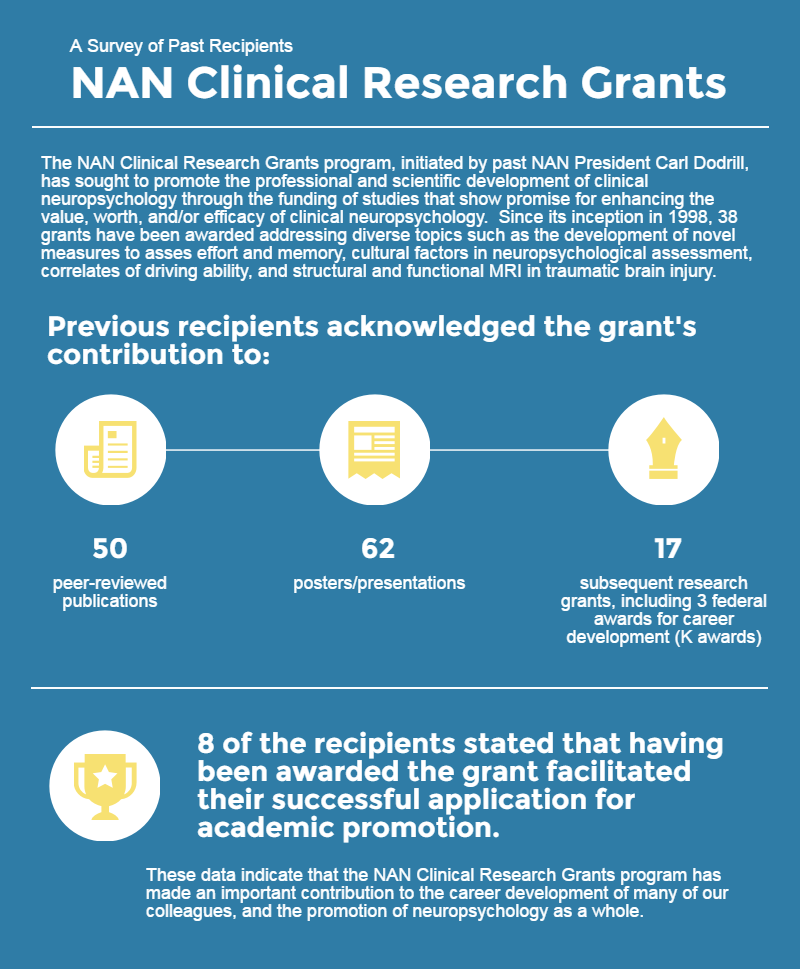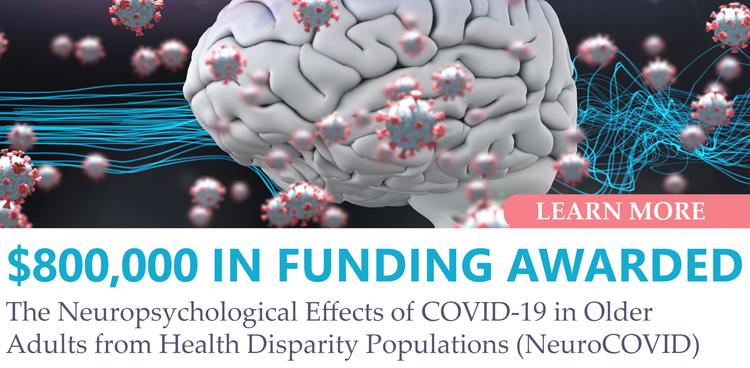Clinical Research Grants Program

The National Academy of Neuropsychology is committed to the professional and scientific development of clinical neuropsychology. The mission of the Clinical Research Grants Program is to support meritorious small grants, pilot projects, or seed grants that address the value, worth, or efficacy of clinical neuropsychological assessment or interventions. These projects might be overlooked by traditional granting agencies because of their applied clinical nature or stage of development. Pilot or seed proposals should demonstrate how they will lead to future funding.
2024 Request for Applications
The landscape of health disparities research now emphasizes health inequities and the role that social determinants of health (SDOH) play in impacting decision making for patients. The U.S. Playbook to Address SDOH, published in November 2023, highlights the need to address social determinants at the individual level, assessing and intervening upon Health Related Social Needs (HRSN). To strengthen capacity for SDOH and HRSN assessment in neuropsychology, new tools and resources need to be refined and applied to neuropsychological paradigms. Some new instruments and software are currently available including the Health Equity Assessment Toolkit and the Accountable Health Communities HRSN Screening Tool that can be applied to Neuropsychological assessment. The objective of this funding program aims to support studies that research health disparities, health inequities and SDOH relative to cognition and neuropsychology. Priorities for funding will be given to support projects addressing systemic drivers of health disparities. Specifically, proposals should focus on HRSN and their impact on cognition, SDOH and systemic impacts on risk for cognitive disorders, interventions designed to address the impact of SDOH at the community health level or HRSN at the individual level as it relates to cognitive health, and other projects with similar themes.
Both cross-sectional and longitudinal research projects will be considered, but completion of the project must be feasible within the maximum 2-year period of funding. Preference will be given to projects that closely fit this RFA. Projects that do not fit closely, but are nonetheless relevant to the mission of the NAN Grants Program (as noted above) may also be considered. Projects that have strong potential to lead to future funding are especially valued.
Additional Resources:
Instructions for Completing NAN Grant Application:
- Follow all page requirements/limitations
- Prepare NIH biosketch
- If postdoctoral fellow, primary mentor needs to complete letter of support
- Sign all forms
- Create one PDF document for entire application
- Email application on or before deadline (May 1, 2024) to: [email protected]

Past Recipients
2024
Jeremy Davis, Psy.D., ABPP
Increasing Access to Neuropsychological Services with a Screen and Triage Model
2023
Maria Mataro, Ph.D. & Claudia Peñaloza, Ph.D.
Lifestyle-SVD: Exploring the Impact of Lifestyle Factors on Cognitive and Emotional Functioning via Small Vessel Disease (SVD) Biomarkers in Healthy Older Adults and Stroke Patients
Victoria Louise O’Connor, Ph.D.
The Effect of Early Psychosocial Risk and Modifiable Lifestyle Factors on Neuropsychological Outcomes Following Mild Traumatic Brain Injury
2022
Anny Reyes, Ph.D.
Identifying the Impact of Social Determinants of Health on Cognitive and Brain Aging in Older Adults with Epilepsy
Troy Webber, PhD
Neuropsychological Assessment Feedback: Does Spaced Retrieval Practice Enhance Recall of and Adherence to Recommendations in Black Veterans?
2021
Cristina A. F. Román, Ph.D.
Impact of Cardiovascular Risk Factors on Cognitive Functioning and Accelerated Brain Aging in Middle-Aged Persons with MS: Implications for Aging Research and Neuropsychological Intervention
Brandon C. Baughman, Ph.D., ABPP-CN & Ansley Stanfill, Ph.D., RN
The Utility of the Neuro-QoL Measures to Trigger Neuropsychological Assessment Post-aneurysmal Subarachnoid Hemorrhage: A Pilot Study
2020
Rosemarie Basile, Ph.D.
Neurocognitive Effects of COVID-19 on Acutely Ill Patients Following Hospitalization
Michelle H. Chen, Ph.D.
Cognitive and Depressive Symptoms in Older Persons with Multiple Sclerosis
Justin Karr, Ph.D.
Advanced Psychometric Interpretation of the Spanish-language NIH Toolbox Cognition Battery: Developing Diagnostic Algorithms for Cognitive Impairment and Interpreting Reliable Change
2019
Eric Hart, Psy.D. & Bradley Ferguson, Ph.D.
Interdisciplinary Predictors of Long-Term Cognitive Recovery following Acute Stroke
Andrew Kiselica, Ph.D.
Reaffirming Neuropsychology’s Central Role in Understanding Alzheimer’s Disease in the Age of Biomarkers
2018
Lucia Cavanagh, Ph.D., UCLA Semel Institute
Common Data Elements in Neuropsychology
Rebecca K. MacAulay, Ph.D., University of Maine
Comparing Neuropsychological Test Scores from the NIH Toolbox to Gold-Standard Cognitive Measures in Socioeconomically Diverse Older Adults
2017
Jean N. Ikanga, Ph.D., Emory University
The African Neuropsychological Test Battery: A Pilot Investigation of Cultural Appropriateness, Reliability, and Factor Structure
James J. Mahoney III, Ph.D., West Virginia University School of Medicine
A Longitudinal Assessment of Neurocognition as a Function of Opioid Abstinence and Potential Moderating Factors Impacting Treatment Outcomes in Individuals with Opioid Use Disorder
2016
Rachel Galioto, Ph.D., Rhode Island Hospital
Does Executive Function Training Improve Outcomes of a Behavioral Weight Loss Program? A Pilot Study
Preeti Sunderaraman, Ph.D., Columbia University Medical Center
Cognitive and Affective Contributors to Financial Capacity and Financial Capacity Awareness
2015
Yana Suchy, Ph.D., University of Utah
Can Motor-Sequence Training Improve Cognition and IADL Performance among Community-Dwelling Older Adults?
Kirsty Bortnik, Ph.D., Northeast Regional Epilepsy Group
Utility of Spanish Auditory and Visual Naming Test in Identifying Word-Finding in Spanish-Speaking Adults with Epilepsy
2014
Brandon Gavett, Ph.D., University of Colorado - Colorado Springs
Development of a Novel Test to Jointly Measure Episodic Memory and Performance Validity
Colette Elliott, Ph.D., Icahn School of Medicine at Mount Sinai
Performance-based Assessment of Executive Functioning in Traumatic Brain Injury
Pia Banerjee, Ph.D., UCLA
Utility of Neuropsychological Measurement in Predicting Radiation-induced Neurocognitive Decline to Inform Treatment Decision-making for Elderly Brain Cancer Patients
2013
Christopher Benjamin, Ph.D., UCLA
Quantitative and Qualitative Analysis of Pre-Surgical fMRI data
Michael Horner, Ph.D., Medical University of South Carolina
Decreasing the Occurence of Suboptimal Effort on Neuropsychological Evaluation
Megan Smith, Ph.D., University of Iowa
Cognition and Psychoneuroimmunology in Multiple Sclerosis
2010
April Thames, Ph.D., UCLA Semel Institute for Neuroscience and Human Behavior
Ethnicity, Stereotype Threat, and Neuropsychological Test Performance: Not as Simple as Black and White
Oren Boxer, Ph.D., UCLA Semel Institute for Neuroscience and Human Behavior
Evidence-Based Knowledge Aggregation for Neuropsychological Practice
2009
Sid O'Bryant, Ph.D., Texas Tech University, Health Sciences Center
Normative Data for the RBANC among English-Speaking Mexican Americans
Jennifer Green, Ph.D., National Center for Post-Traumatic Stress Disorder, Boston Massachusetts
Neuropsychological Evaluation Outcomes for Children and Adolescents with Learning Disabillities
2008
Allyson Harrison, Ph.D., Queens University, Ontario
Development of a symptom validity test for use when assessing adult Reading Disabilities
Julianna Ward, Ph.D., John Hopkins University, School of Medicine
Implicit Learning, Depression, and Occupational Status in Systemic Lupus Erythmatosus (SLE)
2007
Anita Hubley, Ph.D., University of British Columbia
A Comparison of Five Process Scoring Systems Adapted for Use with both the Rey-Osterrieth and Modified Taylor Complex Figures
Risa Nakase Thompson Richardson, Ph.D., Methodist Rehabilitation Center, Jackson, Mississippi
The Value of Effort Testing and Predictive Utility of Effort Indices on the CVLT-2 in Predicting Outcomes in a Consecutive Series of Acute TBI Rehabilitation Admissions
2005
Melissa M. Amick, Ph.D., Memorial Hospital of Rhode Island, Medical Rehabilitation
The predictive utility of contrast sensitivity relative to visual attention and executive function for driving safety in patients with Parkinson’s Disease
Steven R. Smith, Ph.D., University of California, Santa Barbara
Exploring Models of Neuropsychological Assessment Feedback with Adolescent Patients
Jeffrey Wozniak, Ph.D., University of Minnesota Medical School
Sensitivity of Diffusion Tensor Imaging (DTI) in Mild to Moderate Pediatric Traumatic Brain Injury
2004
Thomas Bennett, Ph.D., Center for Neurorehabilitation
Identifying Drivers at Risk from the Neuropsychological Evaluation
Richard O. Temple, Ph.D., Rhode Island Hospital
A National Survey of Physicians’ Knowledge and Use of Neuropsychological Services
Monica Rosselli, Ph.D., Florida Atlantic University
Neuropsychological Assessment of Spanish Speaking Children in the US
2003
Robin Hilsabeck, Ph.D., Texas Tech University
Using an Implicit Memory Task to Estimate Premorbid Memory
2002
Melissa Huy, Ph.D. & Kyle Boone, Ph.D., Harbor UCLA Medical School
Current Practice of Neuropsychological Test Feedback
Renee Lajiness-O’Neil, Ph.D., University of Michigan
Neuropsychological Functioning in Children with Velocardiofacial Syndrome: Predictors of Psychopathology
Wiley Mittenberg, Ph.D., Nova Southeastern University
Identification of Malingered Head Injury on the WAIS-3 and WMS-3
Holly Westervelt, Ph.D., Brown University
The Relationship Between Odor Identification and Memory and Cognition
2001
Karen Bronk Fromin, Ph.D., University of California, San Francisco
Comprehensive Affect Testing System
Cynthia Riccio, Ph.D., Texas A&M University
Neuropsychological Profiles in Adults with Attention Deficit Hyperactivity Disorder (ADHD)
2000
Thomas Hammeke, Ph.D. & Michael McCrea, Ph.D., Medical College of Wisconsin, Milwaukee
Neruocognitive Functioning and Brain Activation in Acute MTBI: A Neuropsychological and Functional MRI Study
Shelley Fleming Ficek, Ph.D. & Alan Schatzberg, Ph.D., Stanford University
Neuropsychological Correlates of Psychotic Features in Depressive Disorders
Tom Tombaugh, Ph.D. & Laura Rees, Ph.D., Carleton University, Ottawa
The Adjusting – PASAT : An Improved, User Friendly Version of the PASAT
1999
Mark Lovell, Ph.D., UPMC Center for Sports Medicine, Pittsburgh
The Comparison of Computerized versus Traditional Neuropsychological Testing in Developing Objective Criteria for Return to Play Following Concussion in High School Athletes
Esther Strauss, Ph.D., et al., University of Victoria
Response Consistency as a Measure of Malingering
David Tucker, Ph.D., University of Texas, Austin
Cognitive-Behavioral Intervention with Refractory Postconcussion Syndrome
Wilfred Van Gorp, Ph.D., et al., Columbia University
Neuropsychological Prediction of “Real World” Functional Capacity
1998
Angelle Sanders, Ph.D., Brain Injury Research Center
Utility of an Experimental Script Analysis Task for Predicting Vocational and Psychosocial Outcome after Traumatic Head Injury
William Whelihan, Ph.D., University Medical Group
Neuropsychology and Driving Competence in Early Dementia